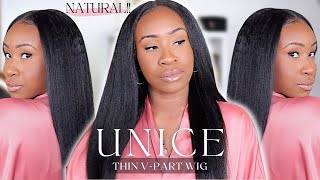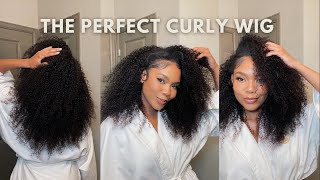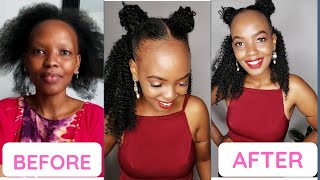Natural Hair Vs. Relaxed hair: What's The Difference?
Most of us know that there’s a difference between relaxed hair and natural hair. One has chemicals used to alter it, and the other doesn’t. Unfortunately, it can go a lot deeper in the African-American community than whether or not you choose to relax your hair.
With lockdowns happening country-wide since the Covid-19 pandemic started in March 2020, salons closed, and women everywhere were forced to find a DIY method to manage their hair. Women with relaxed hair had to stop at their local beauty supply shop and buy what they needed to get the job done.
Some women took the lack of access to a hair salon as a sign that it was time to try something new. If you have a social media account, I’m sure you’ve seen the before and after photos of women that have chosen to grow out their relaxer and transition to natural, as well as the women who have decided to embrace their gray and let go of the hair dye.
Like it or not, many women have been taught to compete with one another. With that competitiveness comes judgment. Natural hair ladies are judging relaxed hair ladies, and those who have grown comfortable with their gray hair are judging those who continue to touch up their roots.
Many of us were programmed growing up to believe that “good hair” is straight hair or hair that doesn’t have a tight curl or kink to it. The competitive spirit has led to a division where we have #teamnatural and #teamrelaxed, passing judgment on one another rather than letting everyone do what they want with their hair.
Whether you choose to wear your hair naturally or relax your hair, the important thing is to keep your hair healthy. Healthy hair doesn’t have anything to do with whether you have natural hair or relaxed hair. Natural hair can have damage, just like relaxed hair can.
Difference Between Natural Hair and Relaxed Hair
This article will talk about the differences between relaxed hair and natural hair and share a little history about the evolution of black hair and where we are today. If you’re on the fence about making a move from one state to the other, hopefully, you’ll find the information you find helpful in choosing to go for it or continue doing what you’re doing.
Natural Hair vs. Relaxed Hair Structure

Chemical creams or lotions create relaxed hair by breaking down the hairs’ natural curl pattern and overall texture, leaving the hair with a sleek, straight appearance. This chemical alteration allows hair to hold styles longer, and you don’t have to worry about hair expansion in humid weather.
Natural hair can be stronger and healthier than relaxed hair because chemicals haven’t stripped it. Natural hair fibers have better volume, bounce, and body than relaxed hair. Hair in its natural state has a higher level of elasticity which helps fight breakage.
Daily Care and Management
If you’ve experienced both natural and relaxed hair care, you would probably agree that relaxed hair is easier to manage. Relaxed hair is less prone to tangles and knots, so you don’t have to spend as much time detangling on wash day, and it’s easier to comb daily.
Healthy relaxed hair is possible when you condition your hair regularly, occasionally use a deep condition, and keep your hair moisturized. You’ll want to stay away from heat as much as possible, using low heat when necessary.
We advise that you should see a professional for chemical treatments to avoid any mistakes or over-processing if you can afford to.
Natural hair is prone to tangling and knotting on itself, making it time-consuming to detangle, comb, and style your hair. However, if you choose to wear a protective style like braids, you have an easier hair care routine compared to relaxed hair.
Whatever style you choose to wear your natural hair, you’ll need a good hair routine to keep your hair healthy and flourishing.
Hair Color

Natural hair is nonporous. The hair cuticle is closed, so it repels everything. If you want to color your natural hair, you’re going to need a semi-permanent or permanent color. You’re going to need a developer to open the cuticle so the color will take. While some say that hair that is colored isn’t natural, you should know that permanent color doesn’t damage hair the same way relaxers do.
On the other hand, relaxed hair is porous and will soak up color, oils, and moisturizers with ease. If you want to color your relaxed hair, you’ll want to look for semi-permanent or temporary hair color. If you’re going to color your grays, you’ll want to check out vegetable dyes. You don’t want to over-process your hair that will lead to damage and possible hair loss.
Cost
Relaxed hair requires the application of a relaxer every 12 weeks. While you can purchase a relaxer kit and do it at home for under $50, we highly recommend you find a professional to relax your hair. You may want to budget for an occasional deep condition hair treatment and trim as well.
If you’ve transitioned to natural hair, finding hair care products that work with your natural hair can involve a lot of trial and error. When trying a product for the first time, it’s best to buy it from a store with a return and exchange policy so that you can return the products that don’t work the way you want them to.
The Evolution of Black Hair

Hair has been an essential part of Black history. Hairstyles like locs, afros, and cornrows have been around for decades, if not centuries. Unfortunately, White Supremacy and Eurocentric beliefs have co-opted these styles, affecting how they evolved. It wasn’t long before smooth and sleek became the desired look for hairstyles.
After Francois Marcel Grateau created the hot comb in the 1800s, black hair progressed in the products used to make hair more manageable. We’re talking about:
- Permanent straighteners
- Jheri Curls
- Wigs
- Braids
- Extensions
In the 1960s, the civil rights movement and the Black Panthers created a move to natural hairstyles and afros as a political statement.
Let’s Get Political
California State Senator Holly Mitchell introduced the Crown Act (Creating a Respectful and Open World for Natural Hair Act) in 2019. The act was signed into law by California State Governor Gavin Newsom and prohibits race-based hair discrimination in the workplace and public and charter schools. These places have regrettably had a history of trying to limit the ability of people of color to wear their hair however they want to.
After California passed the Crown Act, six other states have also passed Crown Act legislation. The six states that have joined California in prohibiting race-based hair discrimination are:
- Colorado
- Maryland
- New Jersey
- New York
- Virginia
- Washington
At the federal level, the United States House of Representatives has passed the Crown Act, and it is currently waiting for approval by the United States Senate. While it may seem like this should have been law a long time ago, let’s be thankful that it’s on the radar of more lawmakers, and institutions can no longer justify their systemic bias in their hiring or admission practices.
It’s Up to You

The real difference between natural hair and relaxed hair depends on whom you ask. For some women, wearing the choice to wear their hair in its natural state is a statement of self-love and acceptance. For others, it’s a sign of resistance against what some feel is a European-centric view of beauty.
Some women that choose to relax their hair do it for convenience. They don’t want to invest the time needed to care for their hair in its natural state. It has nothing to do with self-hate or wishing to appear to be White.
For far too long, women of color have felt that they had to assimilate to be accepted or respected, whether professionally or while pursuing an education. No one should feel like they have to look a certain way to be viewed as employable or competent. We also need to stop judging each other for our personal choices. Let’s focus on what we have in common instead of our differences.
We can’t expect others to accept us for who we are when we struggle to do it within our communities. We have to find a way to release the mindset that tells us that natural hair is unkempt or will prevent us from advancing in our careers. Things will start shifting when we demand that they do.
Many of us grew up believing that our hair defines our beauty. It’s time to ask ourselves if we’re willing to continue enforcing that belief even if it doesn’t serve us, or are we ready to raise a new generation of young women who love themselves and each other, regardless of what they choose to do with their hair?
It’s time to stop letting what we do with our hair define us—choosing to relax your hair or keep it in its natural state is a personal choice. The only opinion that should matter is your own. Wear your hair however you choose and do it with pride!
Whether it’s a personal preference or a political statement, women of color have had to deal with how others perceive their hair if they choose to wear it in a style that isn’t considered mainstream.
This article discusses the differences between natural and relaxed hair and why we shouldn’t let how we choose to wear our hair be another thing that divides us.




